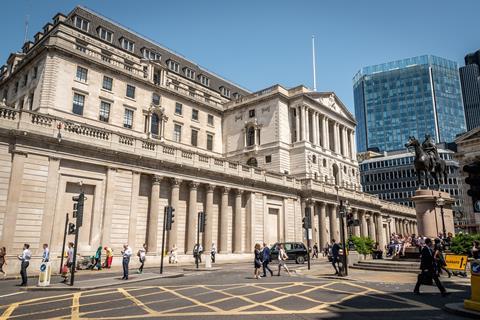RIBA survey finds practices expect workloads to contract for the first time in more than two years
Architects expect the sector to contract for the first time in more than two years, new RIBA figures have revealed as the Bank of England warns the UK may have entered a recession.
RIBA’s latest Future Trends survey found practices expect workloads over the next three months to shrink for the first time since June 2020, in the midst of the first covid-19 lockdown.
August’s index figure fell by 12 points to -8 following five months of instability in the sector caused by soaring inflation, rising energy costs and economic uncertainty. Any index number below zero means respondents expect workloads to fall.

It comes following the Bank of England’s move yesterday to raise interest rates from 1.75% to 2.25%, the highest level for 14 years, in an effort to curb inflation.
The central bank also said it believes the economy shrank by 0.1% between July and September, having previously expected it to grow during the period. The same rate of contraction was recorded between April and June.
It means the UK may now be in a recession, which is defined as two consecutive quarters of contraction.
All four sectors surveyed by RIBA are anticipated by practices to see falling work opportunities over the next three months, despite a slight easing of the outlook for the community sector from an index of -10 to -6.
Private housing, which has been consistently the most buoyant sector since the start of the pandemic, fell into negative territory for the first time since June 2020 with a balance of -9.
The commercial sector fell by three points to -2, while the public sector fell by the same amount to -9.
Pessimism has deepened across all regions, with workload expectations in Wales and the West plunging by 37 points in one month to -22.
The Midlands and East Anglia fell by 10 points to a balance of zero, while the South of England’s score was down nine points to -12 and London’s dropped one point to -7.
Only the North of England expects work to increase, though the region’s index slipped by seven points from +13 to +6.
RIBA head of economic research and analysis Adrian Malleson said rising inflation and soaring energy costs are “clearly weighing heavy on architects’ minds”.
He added: “With reports of construction product inflation, supply chain difficulties, unpredictable project costs, and restricted contractor and trade person availability, many projects are being impacted.
“Indeed, reports indicate that ongoing delays in the planning process are also preventing the timely delivery of projects – applications that once took weeks are now taking several months, with delays occurring across regions and project types.”


























No comments yet